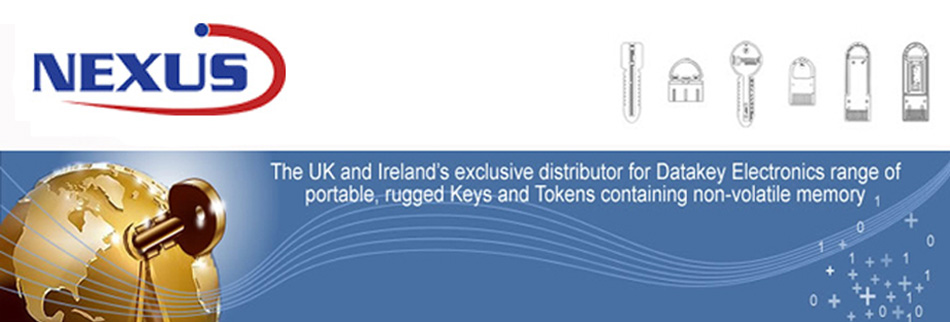
~ Applications include limit use, firmware, data and authentication ~
Nexus GB, the exclusive UK distributor of Datakey Electronics’ range of portable memory products, has launched a range of SlimLine data tokens built to withstand Autoclave and EtO (Ethylene Oxide) sterilisation. The products use enhanced materials that also simplify the manufacturing process resulting in a less expensive product for medical and pharmaceutical OEMs. The tokens retain the multiple-cycle sterilisation capability that has made custom versions of these products popular within the medical device community for years.
Typical applications for the new portable memory products include limit-use, calibration, data upload, firmware updates, data transfer, data logging, user authentication and access control. The enhanced SlimLine tokens have already been tested to survive multiple cycles of autoclave sterilization (265° at 20 psi for 30 minutes) as well as the EtO sterilization process. No failures due to these sterilisation methods have ever been found.
Calibration allows the user to automatically upload parameters from a token to another device to eliminate manual errors. One existing application applies this to a heart monitor with a single use balloon catheter. Each catheter is precisely calibrated before use, using a token, which saves time, reduces implementation cost and eliminates errors.
Limit use allows the tokens to monitor how many times the device has been used and for how long. For instance, a DNA analysis system that uses disposable gel cartridges features a token which activates the equipment, monitors the usage and notifies the system once the cartridge has reached the limit of its lifetime and needs to be replaced.
In addition, Nexus GB has recently made Datakey Electronics’ SR4000 SlimLine receptacle family, required to mate with the tokens, available in the UK. The new receptacles are miniaturised and available in surface mount designs, which are especially suitable for portable medical applications. Furthermore, the company has recently launched the SR4300 receptacle family, which is splash-proof and available in a full IP67 immersion version, to address the full range of medical device design requirements.
The Datakey Electronics tokens and receptacles that Nexus GB offer are already used across the globe by customers including St. Jude Medical, General Dynamics, Cisco Systems, Raytheon, Siemens, Tyco Healthcare, Gilbarco, several governments and many other multi-national corporations.
A copy of this press release is available to download at http://www.nexus-pr.blogspot.com/.
Ends: 380 words
Editor’s note: If you want to stay constantly up to date on the latest news from Nexus GB, paste the following link into your RSS reader http://nexus-pr.blogspot.com/atom.xml. If you don’t have an RSS reader, I can recommend the following free package Sharp Reader.
For further information contact:
Michael Barrett, Operations director, Nexus GB,
Rushdene House, Dodsley Grove, Midhurst, West Sussex, GU29 9BE
Telephone: +44 (0)1730 816502
Fax: +44 (0)1730 817393
www: http://www.nexusgb.co.uk/
e-mail: http://www.blogger.com/Campaign%20planning/michael@nexusgb.co.uk
Press enquiries: Richard Stone
Stone Junction, 33 Kirkdale,
Sydenham, London, SE26 4BT
Telephone: +44 (0) 20 8699 7743
Fax: +44 (0) 20 8699 7743
e-mail: richards@stonejunction.co.uk
www: http://www.stonejunction.co.uk/
About Nexus GB: Established in 1986 Nexus GB is Datakey Electronics’ UK and Ireland exclusive distributor for portable, rugged keys and tokens containing non-volatile memory. These reliable and re-programmable items provide data transport, security, and access control solutions even in extreme environments where other methods, such as USB memory, would not survive. Furthermore, distinct from consumer-like memory solutions, they are a well established product that will not become obsolete as technology progresses. As a result, they are commonly used by design engineers working on long term projects, with more than three million units currently in UK service.
REF: NEX004/07/08
